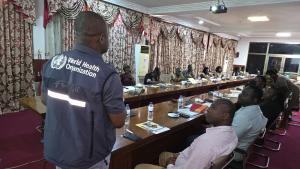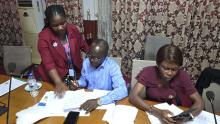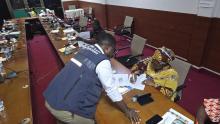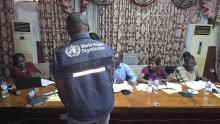Ghana Trains Survey Teams for the 2025 Global School Health Survey to Build the Foundation for Heathier Schools
As Ghana faces a rising tide of noncommunicable diseases (NCDs), the need for early prevention and evidence-based interventions has never been more urgent. In recent years, conditions such as diabetes, hypertension, cardiovascular disease, and some cancers have been on the rise — many linked to unhealthy behaviours that begin in childhood and adolescence. Poor dietary habits, physical inactivity, tobacco use, and harmful use of alcohol among children and adolescents are contributing to this growing burden of disease, threatening the long-term wellbeing of the nation’s youth.
In response to this growing challenge, Ghana is preparing to roll out the 2025 Global School Health Survey (GSHS) — a nationally representative initiative designed to gather critical data on the health behaviours and protective factors among school-going adolescents. The survey, jointly led by the Ministry of Education, Ministry of Health, and Ghana Education Service with technical support from the World Health Organization (WHO) and UNESCO, aims to provide the evidence needed to inform policy and shape responsive, school-based interventions.
To ensure the successful rollout of the survey, a national training programme has been held in Kumasi for 20 data collectors and survey administrators. Participants were equipped with technical knowledge, ethical guidance, and practical tools to administer the survey effectively and responsibly in schools across the country.
In her opening remarks, the Director for School Health and Education Programme (SHEP) at the Ghana Education Service, Mrs Theresa Oppong Mensah, said, “In the Ghana Education Service, we are fully committed to supporting this important data collection exercise. The insights we gather will be critical in shaping more responsive health and education interventions for young people across the country”.
The training covered the full GSHS protocol and questionnaire, including modules on nutrition, physical activity, mental health, alcohol and drug use, sexual behaviour, and the role of family and peer support. In addition, participants received hands-on instruction on accurately measuring height and weight — essential data for assessing risk factors for NCDs.
Dr. Pascal Mwin, Technical Officer for Noncommunicable Diseases at the WHO Country Office, speaking on behalf of the WHO Representative at the training, emphasized the importance of the initiative. “This training is a critical investment in building a stronger foundation for adolescent health in Ghana. By equipping data collectors with the right skills, we’re ensuring the reliability of the data — and ultimately, the effectiveness of the policies and interventions they will inform.”
To reinforce learning, the training included mock interviews, role plays, and a field pre-test in selected schools. These practical components enabled participants to simulate real-life scenarios, sharpen their skills, and build confidence ahead of the survey rollout.
Mrs Yaa Serwaa Assan Ninson, a Programme Officer from UNESCO added, “We’re not just training data collectors — we’re preparing the ground for national action. This data will tell us where our young people are most vulnerable and how schools can become spaces that protect, support, and promote healthier futures”.
This activity is part of WHO’s broader support to strengthen school health systems through guided national programmes on planning and implementation. It also builds local capacity, supports service delivery and governance, and promotes adolescent participation in shaping health responses that affect them.
As Ghana moves closer to implementing the 2025 GSHS, WHO will continue to work with other partners to support government in building healthier school environments by improving data systems, support service delivery, guiding national planning and promoting adolescent participation. These efforts are central to enabling schools to serve not just as places of learning, but as platforms for promoting lifelong health and wellbeing.
For Additional Information or to Request Interviews, Please contact:
Abdul-Lahie Abdul-Rahim Naa
Communications Officer
WHO Ghana Country Office
Email: abdullahiea [at] who.int (abdullahiea[at]who[dot]int)
Tel: +233 20 196 2393



